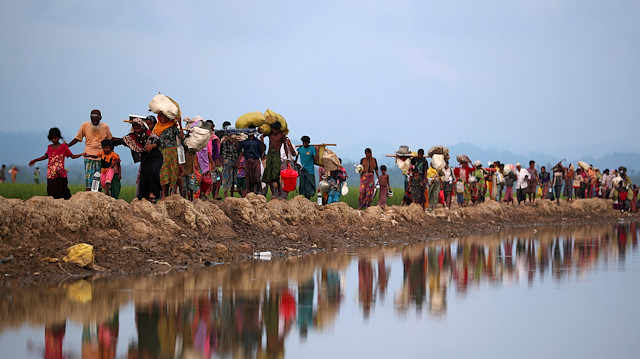
WFP will utilize fund in humanitarian activities for displaced people in Cox’s Bazar, Bangladesh
The European Union agreed to fund the UN World Food Programme (WFP) with €2 million ($2.2 million) to run humanitarian activities for displaced Rohingya refugees in Cox’s Bazar of Bangladesh, the agency said Thursday.
The UN agency will provide life-saving food assistance, address high rates of malnutrition among children and mothers, while also protecting refugees from the risks of the monsoon season, the UN agency said in a statement.
“Two years on since the biggest influx of the Rohingya refugees to Bangladesh, the situation in the camps in Cox’s Bazar remains critical,” said WFP representative and Bangladesh country director Richard Ragan.
He claimed that 80% of around 1 million Rohingya refugees in the camp rely on WFP’s food assistance.
"This timely funding from the EU will help us support the most vulnerable children and women. Part of it will also go towards our disaster preparedness work in the camps,” he added.
The world’s largest and most densely populated refugee camp, which hosts more than 1 million displaced Rohingya from Myanmar, faces sharp risks in the current monsoon season.
“Through our collective efforts, we have saved many lives since the Rohingya crisis began over two years ago,” said Christos Stylianides, EU Commissioner for Humanitarian Aid and Crisis Management.
“The challenge however is far from over as hundreds of thousands of Rohingya rely on humanitarian aid to survive,” the statement cited him as saying.
The EU is one of the WFP’s key donors in Bangladesh and has already provided more than €41 million ($45.5 million) in aid since 2014.
The Rohingya, described by the UN as the world's most persecuted people, have faced heightened fears of attack since dozens were killed in communal violence in 2012.
According to Amnesty International, more than 750,000 Rohingya refugees, mostly women and children, have fled Myanmar and crossed into Bangladesh after Myanmar forces launched a crackdown on the minority Muslim community in August 2017, pushing the number of persecuted people in Bangladesh above 1.2 million.
Since Aug. 25, 2017, nearly 24,000 Rohingya Muslims have been killed by Myanmar’s state forces, according to a report by the Ontario International Development Agency (OIDA).
More than 34,000 Rohingya were also thrown into fires, while over 114,000 others were beaten, said the OIDA report, titled "Forced Migration of Rohingya: The Untold Experience".
Some 18,000 Rohingya women and girls were raped by Myanmar’s army and police and over 115,000 Rohingya homes were burned down and 113,000 others vandalized, it added.


